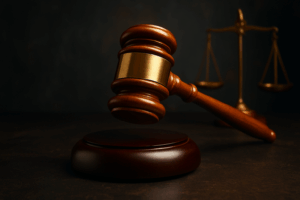**A federal court has suspended the Trump administration's controversial effort to revoke Harvard’s eligibility for foreign student certification, leaving many to question the administration's motives and authority in educational policy.**
**Federal Judge Halts Trump's Attempt to Limit International Student Enrollment at Harvard**

**Federal Judge Halts Trump's Attempt to Limit International Student Enrollment at Harvard**
**Harvard University gains temporary victory as legal battles over foreign student enrollment intensify amid governmental scrutiny.**
In a significant legal development, Harvard University has secured a temporary victory against the Trump administration's attempt to revoke its ability to enroll international students. Following a swift backlash from the prestigious institution, which filed a lawsuit, a federal judge has blocked the government's order while the case navigates the court system.
On Thursday, the Department of Homeland Security (DHS) adapted its stance, allowing Harvard a 30-day window to demonstrate compliance with the Student and Exchange Visitor Programme (SEVP), vital for hosting foreign academics. Secretary Kristi Noem's letter mentioned an "intent to withdraw" the university's certification while stressing the necessity of a response within the stipulated period.
Harvard was previously informed of its decertification through a notice dated May 22, prompting immediate legal action that resulted in a restraining order from Judge Allison Burroughs. The judge indicated that a longer-term injunction would likely follow, ensuring that the university could continue its international programs during the litigation.
This case is being closely scrutinized not only by legal experts but by other universities and the international student community concerned about the potential implications of the government's actions. Two primary legal questions dominate Harvard's challenge: whether the reasons for targeting its SEVP certification are legally sound and whether those reasons are genuine or based on ideological disagreements with the institution.
The broader implications of this case could set a significant precedent regarding governmental influence on academic institutions. Aram Gavoor, an associate dean at George Washington University Law School, pointed out the potential for a fast-tracked appeal to higher courts if the issue remains unresolved.
As part of the lawsuit, Harvard argues its First Amendment rights are being infringed upon, citing that the government's action appears retaliatory and potentially punitive towards the university's academic freedom and governance. Legal authorities suggest that if the courts view the government's rationale as firmly rooted in ideological bias, the judiciary may lean towards siding with Harvard.
The tensions are not just legal; they reflect deeper cultural divides. President Trump has openly criticized Harvard's ideological leanings on social media, suggesting that the university's policies contribute to its adverse actions against international students, particularly Jewish students, as mentioned in DHS communications.
Despite Harvard's robust defense against the administrative decertification, nuances in the law may complicate the case. The Trump administration historically justified restrictions on international visas based on perceived threats to national security, which could complicate any court ruling in Harvard's favor.
Yet, as potential pitfalls loom, many believe the administration's aggressive tactics may already have a chilling effect on international student enrollment, irrespective of the eventual court outcome. The discourse surrounding Trump’s proposal to limit foreign students to 15% of Harvard’s student body positions this case at the intersection of education and immigration policy, raising urgent questions about academic autonomy and ideological freedom in American higher education.
On Thursday, the Department of Homeland Security (DHS) adapted its stance, allowing Harvard a 30-day window to demonstrate compliance with the Student and Exchange Visitor Programme (SEVP), vital for hosting foreign academics. Secretary Kristi Noem's letter mentioned an "intent to withdraw" the university's certification while stressing the necessity of a response within the stipulated period.
Harvard was previously informed of its decertification through a notice dated May 22, prompting immediate legal action that resulted in a restraining order from Judge Allison Burroughs. The judge indicated that a longer-term injunction would likely follow, ensuring that the university could continue its international programs during the litigation.
This case is being closely scrutinized not only by legal experts but by other universities and the international student community concerned about the potential implications of the government's actions. Two primary legal questions dominate Harvard's challenge: whether the reasons for targeting its SEVP certification are legally sound and whether those reasons are genuine or based on ideological disagreements with the institution.
The broader implications of this case could set a significant precedent regarding governmental influence on academic institutions. Aram Gavoor, an associate dean at George Washington University Law School, pointed out the potential for a fast-tracked appeal to higher courts if the issue remains unresolved.
As part of the lawsuit, Harvard argues its First Amendment rights are being infringed upon, citing that the government's action appears retaliatory and potentially punitive towards the university's academic freedom and governance. Legal authorities suggest that if the courts view the government's rationale as firmly rooted in ideological bias, the judiciary may lean towards siding with Harvard.
The tensions are not just legal; they reflect deeper cultural divides. President Trump has openly criticized Harvard's ideological leanings on social media, suggesting that the university's policies contribute to its adverse actions against international students, particularly Jewish students, as mentioned in DHS communications.
Despite Harvard's robust defense against the administrative decertification, nuances in the law may complicate the case. The Trump administration historically justified restrictions on international visas based on perceived threats to national security, which could complicate any court ruling in Harvard's favor.
Yet, as potential pitfalls loom, many believe the administration's aggressive tactics may already have a chilling effect on international student enrollment, irrespective of the eventual court outcome. The discourse surrounding Trump’s proposal to limit foreign students to 15% of Harvard’s student body positions this case at the intersection of education and immigration policy, raising urgent questions about academic autonomy and ideological freedom in American higher education.




















